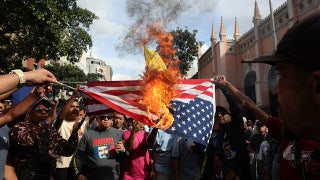BARCELONA, Spain – For teacher Elisa Aroca, Sunday was the moment Spain lost the battle for the hearts and minds of 7.5 million people living in the Catalonia region.
Aroca intended to defend her Spanish roots and cast a ballot against Catalonia breaking away from the rest of the country. But when a squad of police in riot gear marched up, roughly tossed her and other voters aside and shattered the glass entrance of the Estel School in central Barcelona to confiscate ballot boxes, she felt something break inside her.
"I felt so angry and hurt inside that I thought, 'A country that hits me wants me to stay? You don't listen to me and on top of it you hit me?' For me that is abuse," she said a day later.
Similar indignation swept across the wealthy northeastern region, one of 17 in Spain, as police stormed through packs of voters and peaceful protesters at polling stations.
The outrage was compounded as mobile phone footage made the rounds on social media, showing officers in body armor pushing people, dragging them by the hair and hitting them with batons. Hundreds of civilians and police officers were injured. The Spanish government, acting on a judge's order to shut down the referendum, defended the response as professional and proportionate.
The ugly scenes run the risk of confirming a long-held belief among many Catalans that the region is chronically mistreated by Spain's central government despite serving as an economic driver for southern Europe — it generates a fifth of Spain's 1.1 trillion-euro economy — and having a high degree of self-governance.
Catalan officials said that 90 percent of the 2.3 million people who voted Sunday were in favor of independence. But fewer than half of those eligible to vote turned out. The vote was boycotted by most of Spain's national parties on grounds it was illegal and lacked basic guarantees, such as a census.
Polls and the most recent regional elections showed residents of Catalonia roughly split on the divisive issue of independence, but it remains to be seen how many people like Aroca are changing their minds after the events of recent weeks.
"I was crying from rage," she recalled. "Now, I was going to vote no matter what. My husband and I didn't even have to talk about it, we just looked each other in the eyes and we knew that we had to vote. And that we had to vote 'yes' (for independence)."
Born of parents from other parts of Spain, Aroca, a 40-year-old mother of two, still wants to embrace a dual identity of both Spanish and Catalan. But she says the political crisis caused by a lack of dialogue between Spanish Prime Minister Mariano Rajoy and Catalan regional chief Carles Puigdemont has forced her to choose.
"All bonds have been broken. Not by the referendum, but by the police," Aroca said. "I feel rage and pain. I think that is how most people feel, seeing what people are chatting about, talks I have had at work. (Sunday) night I was very sad, truly sad that it has reached this point of me wondering what kind of country my daughters will inherit."
Aroca also believes that Puigdemont and other leaders of the separatist movement are partly to blame for provoking the crackdown when they flouted court orders to stop the vote on grounds that it could violate Spain's constitution.
Puigdemont has vowed to act on the results regardless of the legality of the referendum. He is expected to present them this week to Catalonia's regional parliament, which could trigger the process of starting to break away from Spain. Such a move that would inevitably be met by a robust response from Madrid, and Spain's interior minister has said the 5,000 extra officers deployed to Catalonia will stay as long as necessary.
Ruben Satinya is afraid more clashes are coming. The 40-year-old father of one felt compelled to join the separatist camp when Spain first tried to stop the referendum.
When a judge ordered police to seal off polling stations before the vote, Satinya joined a groundswell of parents who occupied their local schools from Friday to Sunday, staying overnight in sleeping bags and organizing activities for children during the day.
The Congres-Indians School, which Satinya helped occupy, was not hit by police even though it is just a 15-minute walk from the Estel School.
But Satinya said voting amid the fear that police could descend at any moment made him feel more Catalan than ever, and convinced him that severing centuries-old ties with Spain was necessary.
The transformative experience reached its climax when the polls closed and the crowd gathered at the school joined in singing the Catalan anthem, "Els Segadors" ("The Reapers" in Catalan).
"There really is a different sentiment that sets us apart from the rest of Spain, and that was reinforced in me," he said. "Hearing Els Segadors sung by so many people, I got goose bumps. It was spectacular."








































